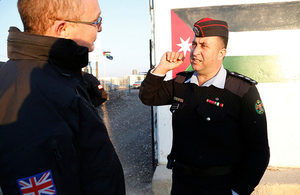UK-supported community police project making Jordan's Za'atari camp safer for Syrian refugees
Community Police assistance is now available 24 hours a day, 7 days a week, and residents can seek advice at the Community Police Station.

Former British police officer Stephen Boddy speaks with Lieutenant Ahmad Mjalli of the Jordanian Community Police team in the Za’atari refugee camp. Photo: DFID / Russell Watkins
On the beat with the Za’atari community police
A two-part survey by the British Embassy Amman Policing Support Team shows the positive impact of community policing on perceptions of safety in Za’atari Syrian Refugee Camp. Of the respondents interviewed in February 2015 who were aware of the Community Police, 74% agreed or strongly agreed that they make the camp a safer place, whilst 59% responded that they have absolute or moderate trust in the police—a figure in line with levels of trust in police around the world.
In December 2013, the British Embassy team and the Syrian Refugee Affairs Directorate (SRAD) began a joint initiative to train, mentor and provide material support to Community Police from the SRAD, the Jordanian authority responsible for the camp. The British Ambassador to Jordan, Edward Oakden, said of the partnership:
The UK is proud to be supporting the Jordanian police to improve security in Za’atari camp.
We want to ensure that the Jordanian authorities and communities have the support they need to remain resilient in the face of the ongoing refugee crisis.
Community Police assistance is now available 24 hours a day, seven days a week, and residents can seek advice and help at the recently opened Za’atari Community Police Station. Regular foot patrols within the camp provide an opportunity for residents to chat with police, raise concerns and for officers and Syrian refugees to solve problems together. The SRAD and the team from the British Embassy will also introduce a custom-built mobile police station later this year to increase access to police services for those living in outlying areas of the camp. Another innovation to ensure that the most vulnerable groups are taken into account has been the building and equipping of a privacy room for women and children in the main Community Police Station.
Compared with results from a baseline survey conducted in November 2013, just before community policing was introduced to the camp, more refugees now feel it is safe or very safe to walk alone in the camp, meaning they can access vital services and facilities unafraid.
Mohammed Abu Ibrahim, one of the community leaders in Zaatari’s District 6, said:
It’s good to see the Jordanian police here in the camp every day.
Having lived in Za’atari since 2013, Mohammed initially attributed the police’s presence to insecurity within the camp:
When we first saw the police patrolling on foot in the camp, we thought there must be a problem, but now they are just here every day. They are approachable and friendly, and they try to help solve everyday problems, such as access to water, electricity or healthcare, as well as any crime issues.
The police for their part feel at ease with the camp residents and have abandoned the hard-shelled protective caps with which they were initially equipped; they don’t need them. Nor have the short batons they carry for personal safety ever been used.
“Walking around Za’atari is like walking around any other town in Jordan, and the people are like any other people in Jordan,” said one community police officer to Stephen Boddy, the Policing Support Team’s expert on Community Safety.
Stephen and his team are currently working with the police to use the survey findings to identify areas that are still perceived as particularly unsafe in order to patrol more effectively. Areas for improvement include combatting growing concerns over the perceived safety of sending children to school and finding ways to redress the gender gap that still exists in both awareness of and access to the police and perceptions of personal safety in the camp.
A new British Embassy initiative to recruit and train Community Police Assistants – retired officers who will assist in the Community Police’s engagement efforts with the camp community – will include at least 10% women initially, with an aspiration to reach 25% in the near future.
A presentation of the survey’s findings is available from the Syrian Regional Refugee Response Inter-agency Information Sharing Portal in English and Arabic.
About the Policing Support Team
The British Embassy Amman Policing Support Team (PST) is a team of security-sector consultants and practitioners. Acting upon the Jordanian Government’s request for assistance in the handling of the humanitarian and development challenges posed by the conflict in neighbouring Syria, the PST is providing strategic advice, training and mentoring to the civil security services in Jordan. These interventions aim to enhance the public safety capabilities of the Jordanian police forces, and improve their response to the safety and security needs of Syrian refugees in Jordan and their host-communities. The PST is financed by the British Government’s Conflict, Stability and Security Fund and is part of UK support to Jordan totalling more than £70 million ($110m) this year alone.